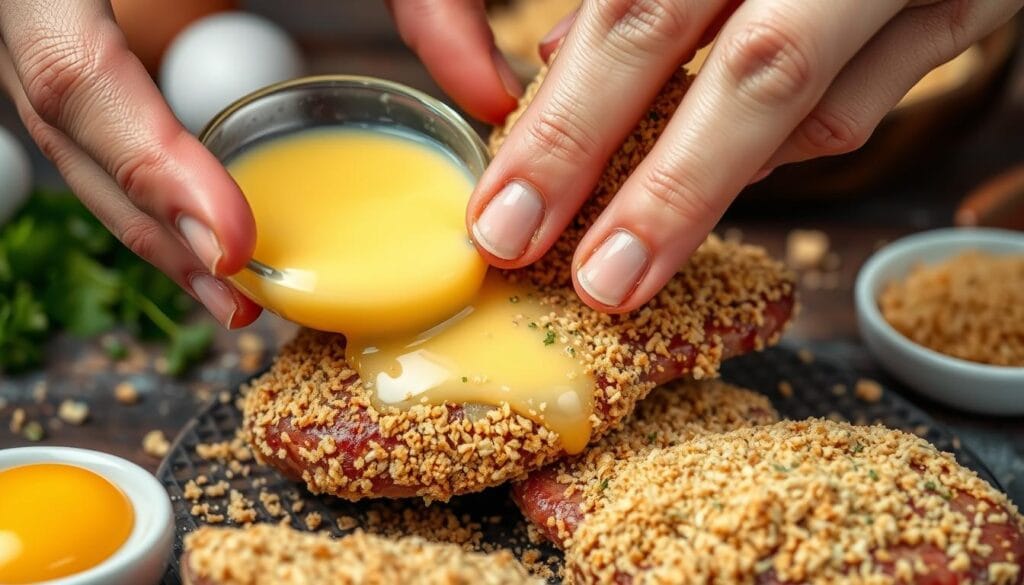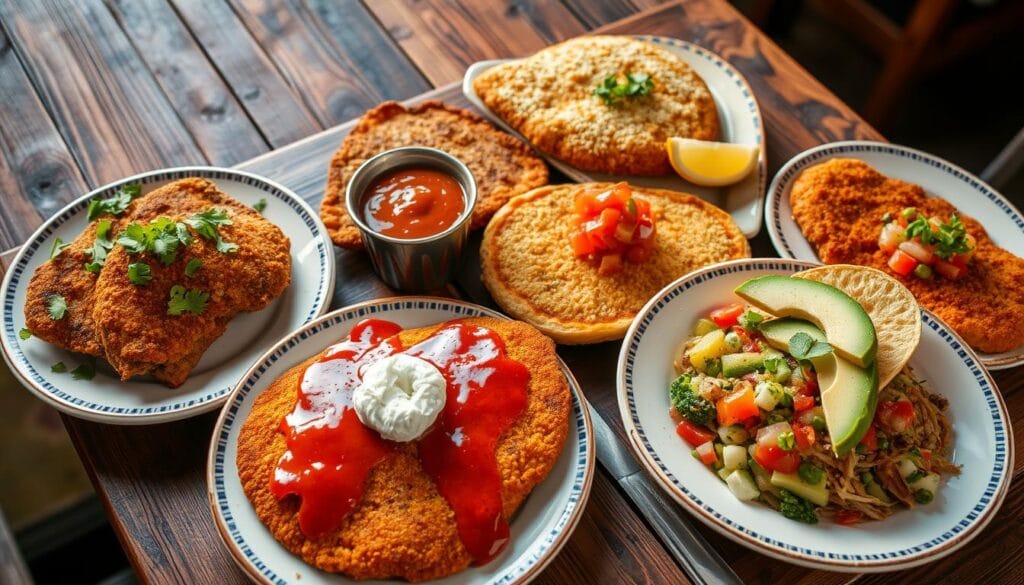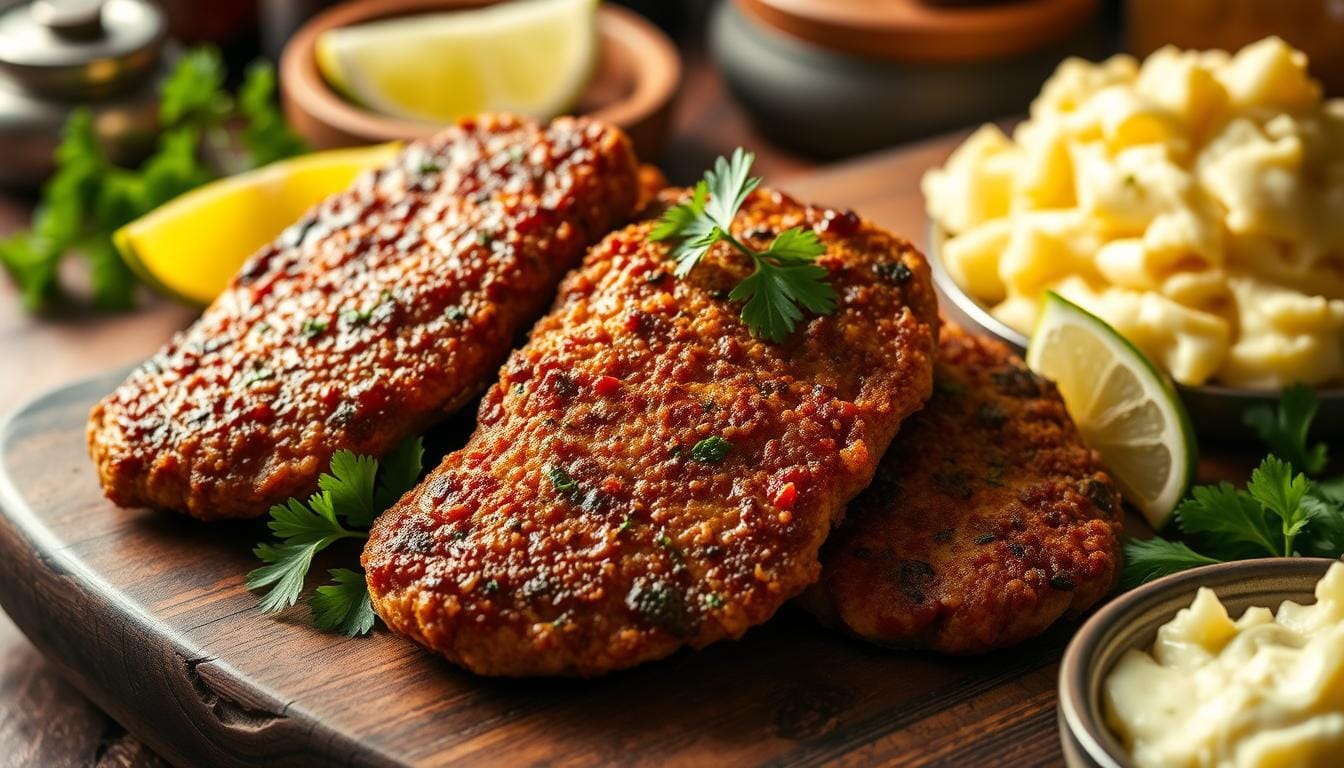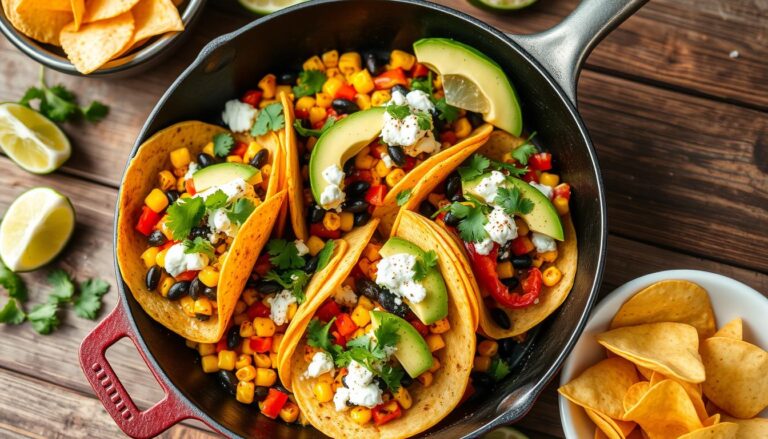Milanesas Steak: Discover the Secrets of This Beloved Latin Dish
Table of Contents
Milanesas Steak: Discover the Secrets of This Beloved Latin Dish
Growing up in a lively Latin American kitchen, I remember the sound of milanesas steak hitting the pan. It filled our home with a delicious smell that promised comfort and tradition. This breaded steak was more than a meal; it was a link to our cultural roots, a tradition passed down through generations.
The Argentine steak tradition is deep, turning simple meat into a crispy, golden dish. It’s loved in Latin American cuisine. From street markets to family dinners, milanesas steak is a celebration of heritage, flavor, and skill.
Every slice of milanesas steak has a story. It’s about immigration, adaptation, and the mix of cultures in Latin American cuisine. Whether you love food or just want to try something new, get ready for a tasty journey into milanesas steak.
Key Takeaways
- Milanesas steak originated from Italian immigrant cooking traditions
- The dish represents a perfect blend of European technique and Latin American flavor
- Breaded steak is a versatile meal enjoyed across multiple countries
- Proper preparation is key to achieving the perfect crispy texture
- Each region has its unique twist on the classic milanesas recipe
The Rich Heritage of Latin American Breaded Steaks
Milanesas are a fascinating journey through food that connects cultures. This dish tells a story of immigration, adaptation, and delicious transformation across Latin America.
The roots of lean beef cutlets go back to Italian immigrants in the early 1800s. They brought their cooking techniques to South America. This changed Latin American cuisine forever.
Origins in Italian Immigration
Italian settlers brought their treasured beef milanesa recipe to South America. They adapted it to local tastes and ingredients. Thin-slicing and breading meat became a staple in countries like Argentina, Brazil, and Mexico.
“Food is our common ground, a universal experience.” – James Beard
Cultural Significance in Latin America
- 87% of Latin American chefs consider milanesa a comfort food
- Over 40% of Latin households prepare milanesa regularly
- In Argentina, approximately 68% of families eat milanesa weekly
Evolution Through Generations
The milanesa has grown from a simple dish to a culinary icon. Over time, regional variations showed off local flavors and cooking styles.
| Country | Milanesa Variation | Meat Preference |
|---|---|---|
| Argentina | Classic Beef Milanesa | Beef (68%) |
| Mexico | Torta Milanesa | Beef (60%) or Chicken (50%) |
| Brazil | Milanesa com Arroz | Varied Meats |
The milanesa’s journey shows the beauty of cultural exchange through food. It turned a simple breaded steak into a beloved Latin American tradition.
Understanding Milanesas Steak: A Perfect Cut Selection
Choosing the right cut of beef is key for a true milanese style steak. The best pan-fried breaded steak comes from high-quality meat. This meat should offer great flavor and texture.
Best Cuts for Milanesas
For a thinly pounded steak, some cuts are better than others. Here are the top picks:
- Top Round: Lean and affordable, perfect for budget-conscious cooks
- Sirloin: Offers more fat content for enhanced juiciness
- Inside Round: Budget-friendly alternative to top round
- Tenderloin: Premium option for a more tender milanesa
Proper Thickness and Preparation
Getting the right thickness is essential for a true milanesa experience. You want a cut that’s uniformly thin. This ensures even cooking.
“The secret to a perfect milanesa lies in the precise pounding of the meat”
Quality Indicators for Selection
| Cut | Fat Content | Tenderness | Price Range |
|---|---|---|---|
| Top Round | Low | Moderate | $ |
| Sirloin | Medium | High | $$ |
| Tenderloin | Low | Very High | $$$ |
Pro tip: No matter the cut, always pound the meat to a consistent 1/4 inch thickness. This ensures even cooking and that crispy texture we all love.
Essential Ingredients for Authentic Milanesas
To make the perfect milanesas steak, you need the right ingredients. These turn lean beef cutlets into a crispy dish. Start by knowing the key parts that make this Latin American favorite.
- Lean beef cutlets: Typically top or bottom round cuts
- High-quality breadcrumbs
- Fresh eggs for coating
- All-purpose flour
- Seasonings like salt, pepper, and optional herbs
To get the breading just right, follow a certain way. Each cutlet should:
- Be lightly dusted with flour
- Be dipped in beaten eggs
- Be coated well with seasoned breadcrumbs
“The secret to perfect milanesas is in the coating – crisp, golden, and full of flavor.”
Experts say to use a 3:1 ratio of plain to seasoned breadcrumbs. This mix gives a great crunch and taste. Your aim is a thin, even coating that keeps the meat juicy and adds a crispy outside.
The Art of Breading and Seasoning Techniques
Mastering the art of making a crispy steak is key to a delicious beef milanesa. This dish needs precision and care to turn simple meat into a culinary gem.

Getting the breading right is crucial. It makes your beef milanesa go from good to great. Let’s dive into the essential steps for a crispy steak every time.
Traditional Breading Method
The classic breading method has three main steps:
- Flour coating: Creates a dry surface for egg adherence
- Egg wash: Helps breadcrumbs stick to the meat
- Breadcrumb layer: Provides the ultimate crispy exterior
Signature Spice Combinations
Enhance your milanese style steak with these flavorful seasoning blends:
| Seasoning Blend | Key Ingredients | Flavor Profile |
|---|---|---|
| Classic Argentine | Garlic powder, paprika, black pepper | Bold and robust |
| Mexican Inspired | Cumin, chili powder, oregano | Spicy and aromatic |
| Brazilian Twist | Dried parsley, onion powder, cayenne | Zesty and bright |
Common Breading Mistakes to Avoid
Avoid these mistakes to prevent a soggy steak:
- Skipping the meat tenderization
- Using wet meat during breading
- Overcrowding the pan
- Using oil that’s not hot enough
“The secret to a perfect beef milanesa lies in the details of preparation and technique.”
Pro tip: Use panko breadcrumbs for an extra crispy exterior that will transform your milanese style steak into a restaurant-quality dish. Keep the oil at 375°F and cook each side for 3-4 minutes until golden brown.
Perfect Pan-Frying Methods for Crispy Results
Mastering pan-frying milanesas steak needs precision and skill. Your journey to a crispy steak starts with choosing the right cooking method. This will give you a golden-brown outside and a tender inside.
Here are key tips for the ultimate pan-fried breaded steak:
- Use a heavy-bottomed skillet for even heat distribution
- Heat oil to 375°F for optimal crispiness
- Cook each side for 3-4 minutes until golden brown
- Avoid overcrowding the pan to maintain crisp breading
Preparation is key for a perfect milanesas steak. Make your meat about 1/8 to 1/4 inch thick for even cooking. Coat the steak thoroughly in seasoned breadcrumbs. This creates a protective layer that turns beautifully crisp when pan-fried.
“The secret to a perfect crispy steak is in the technique, not just the ingredients.” – Argentine Culinary Experts
Other cooking methods can also give great results:
- Baking at 375°F for 15-20 minutes
- Air frying at 375°F for 10-12 minutes
- Oven-baking at 440°F for a quick crisp
Pro tip: Let your pan-fried breaded steak rest for a few minutes after cooking. This helps keep the juices in and the texture crispy.
Regional Variations of Milanesas Across Latin America
Latin American cuisine loves milanesas steak, adding its own twist to this dish. This journey shows a mix of flavors and traditions across the continent. It’s a reflection of the diverse cultures of Latin America.

Argentine Style: The Classic Preparation
Argentine steak milanesas are a culinary dream. They use high-quality beef like top round or ribeye. The Argentine way is simple yet uses the best ingredients.
- Preferred cuts: Top round, ribeye
- Typical serving: With chimichurri sauce
- Cooking method: Pan-fried to golden perfection
Mexican Culinary Innovations
Mexico’s take on milanesas steak is full of creativity. The torta de milanesa shows how it’s part of street food culture.
- Often served in sandwiches (tortas)
- Topped with spicy tomato sauce
- Frequently accompanied by melted cheese
Brazilian Flavor Influences
Brazil adds its own twist to beef milanesa. It’s paired with traditional foods that show the country’s rich culinary history.
| Brazilian Milanesa Characteristics | Traditional Pairings |
|---|---|
| Meat Variations | Feijoada (bean stew) |
| Breadcrumb Diversity | Farofa (toasted cassava flour) |
“The beauty of milanesas lies in their ability to adapt to local tastes while maintaining their essential character.” – Latin American Culinary Expert
Every region’s milanesas tell a story of cultural adaptation. They show that milanesas are more than food – they’re a journey through Latin America.
Classic Side Dishes and Accompaniments
Choosing the right side dishes can make your milanese style steak meal special. The best sides complement the crispy texture and rich flavor of milanesas steak. They also add nutritional variety to your plate.
Traditional side dishes for milanesas steak offer a variety of flavors and textures. Your plate can become a feast with these classic options:
- Creamy Mashed Potatoes
- Crispy French Fries
- Fresh Garden Salads
- Steamed White Rice
- Roasted Vegetables
For your breaded steak, try these tasty sauce options. They make your meal even more enjoyable:
| Sauce | Flavor Profile | Origin |
|---|---|---|
| Chimichurri | Tangy, Herbal | Argentina |
| Garlic Aioli | Creamy, Rich | Mediterranean |
| Tomato Salsa | Fresh, Spicy | Latin America |
“The right side dish can transform a good milanesas steak into an unforgettable meal.” – Chef Maria Rodriguez
Remember, portion sizes are important. A typical serving of milanesas steak has about 873 calories, 75g of protein, and 99g of carbs. Pairing it with lighter sides makes for a balanced meal that’s both filling and healthy.
From Home Kitchen to Restaurant Quality Milanesas Steak
To turn your lean beef cutlets into restaurant-quality, you need precision and skill. Professional chefs know how to make milanesas that look great and taste amazing.
Professional Chef Secrets for Perfect Milanesas
For top-notch thinly pounded steak, start with the right preparation. Here’s what top chefs suggest:
- Use a meat mallet to achieve uniform 1/8 to 1/4 inch thickness
- Select top round or bottom round cuts for optimal tenderness
- Rest breaded cutlets for 10-15 minutes before cooking
Temperature Control for Crispy Steak
To get a crispy steak, control the temperature well. Professional kitchens fry at 375°F. This ensures even cooking in 3-4 minutes per side.
| Cooking Method | Temperature | Cooking Time |
|---|---|---|
| Pan Frying | 375°F | 3-4 minutes per side |
| Baking | 375°F | 8-10 minutes per side |
Elegant Plating Techniques
To make your milanesas look like they’re from a restaurant, focus on plating. Add fresh herbs, vibrant side dishes, and use white plates. This makes the golden-brown cutlets pop.
“The difference between good and great cooking is often in the details of preparation and presentation.” – Professional Chef Recommendation
By using these professional tips, you can make your milanesas taste like they’re from a fancy restaurant.
Health Considerations and Modern Adaptations
Today, we’re making lean beef cutlets healthier. Fans of milanesas steak can now enjoy their favorite dish with less guilt. This is thanks to new cooking methods and nutritional tweaks.
Nutrition experts suggest a few ways to make milanesas healthier:
- Try using whole grain or almond flour instead of regular breadcrumbs
- Choose leaner beef cuts to cut down on saturated fats
- Use baking or air frying instead of deep frying
Air frying is a big deal for breaded steak. It lets you get that crispy texture with way less oil. Just a light spray of oil can help you eat fewer calories while keeping the milanesas crunchy.
“Healthy eating doesn’t mean sacrificing flavor – it’s about making smarter choices.” – Culinary Nutrition Expert
| Cooking Method | Oil Usage | Calories |
|---|---|---|
| Deep Frying | High | 350-400 calories |
| Air Frying | Low | 250-300 calories |
| Oven Baking | Minimal | 220-280 calories |
If you follow a special diet, there are milanesas for you too. Plant-based and gluten-free options are becoming more common. You can try cutlets made from jackfruit, tofu, or chickpeas. They keep the classic taste but fit different dietary needs.
Conclusion: Mastering the Art of Milanesas
Your journey into milanesas steak is more than food—it’s a celebration of Latin American culture. You’ve learned that making the perfect breaded steak needs precision, passion, and practice. Every step, from choosing the meat to getting that crispy texture, shares a story of tradition and taste.
Preparing milanesas steak is more than just cooking. It’s about knowing the right mix of ingredients and the methods passed down through generations. Whether you use sirloin or flank steak, the secret is keeping it thin and mastering the breading process. This turns a simple cut into a crispy steak masterpiece.
Don’t be afraid to try different ways of making milanesas. Your kitchen is a place where old traditions meet new ideas. Remember, the key to being great is to keep practicing, be patient, and always be ready to learn from each dish you make.
We encourage you to share your milanesas stories, swap recipes, and keep exploring this amazing tradition. Your journey with milanesas steak is just starting. Every meal is a chance to connect with a rich culture and make memories that will last forever.
FAQ
What exactly is a milanesas steak?
What cut of beef is best for making milanesas?
How do I achieve the perfect crispy coating on milanesas?
Are there variations of milanesas in different Latin American countries?
Can I make a healthier version of milanesas?
What are the best side dishes to serve with milanesas?
How long should I cook milanesas?
Can vegetarians enjoy milanesas?
Source Links
- https://www.wiseguyshhi.com/popular-steak-dishes-from-around-the-world/ – Popular Steak Dishes From Around The World
- https://www.isabeleats.com/torta-de-milanesa/ – Sink Your Teeth into This Mouthwatering Torta de Milanesa Recipe!
- https://jazminrecipes.com/torta-milanesa-guide/ – Torta Milanesa: The Complete Guide to a Staple of Mexican Cuisine
- https://www.yahoo.com/lifestyle/25-beef-dishes-around-world-121545758.html – 25 Beef Dishes Around The World You Need To Try
- https://www.pleasantonweekly.com/blogs/tri-valley-foodist/2024/07/02/american-wagyu-beef-arrives-at-tri-valley-supermarkets/ – American wagyu beef arrives at Tri-Valley supermarkets
- https://sightlyrecipes.com/what-cut-of-meat-is-milanesa/ – What Cut of Meat Is Milanesa?
- https://www.mychicagosteak.com/steak-university/cook-milanesa-steak?srsltid=AfmBOootbwEdZYgDQNozUclK71_GLT-4MPSR5EZo91PeqwD_1Ta-4CvB – How to Cook Milanesa Steak | Steak University
- https://guide.michelin.com/en/article/features/argentinian-meat-the-star-of-the-show-in-the-country-s-best-restaurants – Argentinian Meat: the Star of the Show in the Country’s Best Restaurants
- https://www.latinasquecomen.com/la-milanesa/ – Milanesa Steak Recipe
- https://www.elmundoeats.com/make-steak-milanesa/ – Milanesa Steak
- https://www.tasteofhome.com/recipes/milanesa-steak/?srsltid=AfmBOoqZTYhLSAeqEV842Iuh9lLk5Vq1WjAMvwI3MAyd5o_UmOdx6hVq – Milanesa Steak
- https://www.tasteofhome.com/recipes/milanesa-steak/?srsltid=AfmBOoqnKQxRE8_zs1Ok_ywHDKegsUThleGTI1MapqqYgRpNzAAprtSA – Milanesa Steak
- https://meplusfood.com/how-to-cook-milanesa-steak-without-breading/ – How To Cook Milanesa Steak Without Breading – Me + Food
- https://favoriteflavorrecipes.com/is-milanesa-steak-tender-to-eat/ – Is Milanesa Steak Tender to Eat? A Comprehensive Guide
- https://www.mychicagosteak.com/steak-university/cook-milanesa-steak?srsltid=AfmBOorPA8SOqf_nu3rx4UvnEgx_8SNc9OOVhFwAaHkHk2PmziwAHvVu – How to Cook Milanesa Steak | Steak University
- https://www.tasteofhome.com/recipes/milanesa-steak/?srsltid=AfmBOopo_QIpjsKwbjH3rUEShf1UiY_amN9RMr9-RiWwhTLiTfSvSHNd – Milanesa Steak
- https://manorearecipes.com/beef-milanesa/ – Best Beef Milanesa: A Flavorful Latin American Classic
- https://www.whatisusedfor.com/beef-milanesa/ – Beef Milanesa – What Is Used For
- https://blog.amigofoods.com/index.php/other-latin-foods/best-latin-foods/ – Latin Food: The 50 Best Latin Dishes
- https://sundaysuppermovement.com/beef-milanesa/ – Beef Milanesa
- https://www.tasteofhome.com/recipes/milanesa-steak/?srsltid=AfmBOoqR8mtty6qBCKNOGygvHszSn84fcndFmYXirS-5YlJexwzy1lFx – Milanesa Steak
- https://www.tasteofhome.com/recipes/milanesa-steak/?srsltid=AfmBOorMzjm4sqWSPvy7Rwb3HZs1B4GDIZfD-FNZXmHShjFUg8pVwqOx – Milanesa Steak
- https://www.tasteofhome.com/collection/steakhouse-recipes/?srsltid=AfmBOoohQH4l7R5jRGhtHqxrptZxgxkh4S3KR5Qaqe7u9Y6si_QKfFmY – 37 Steakhouse Recipes You Can Make at Home
- https://www.technomic.com/press-2025-global-restaurant-trends-forecast/ – 2025 Global Restaurant Trends Forecast
- https://en.wikipedia.org/wiki/Beef – Beef
- https://www.danperlman.net/category/online-publications/ – Online Publications – The Mind of Dan Perlman
- https://www.korespa.com/en/milanesa-recipe-2/ – Milanesa recipe: A Classic Uruguayan Comfort Food – Korespa.com
- https://www.5280.com/san-telmo-market-in-golden-serves-argentine-specialties-with-a-side-of-community/ – San Telmo Market in Golden Serves Argentine Specialties with a Side of Community
- https://arteflame.com/pt/blogs/receitas/receita-de-arteflame-vitela-milanesa?srsltid=AfmBOop5HMJiP–_MkiMN2s2HjARsrVtdr70uc13_ll9x4qCsrlogzO1 – Arteflame Grilled Veal Milanese Recipe







